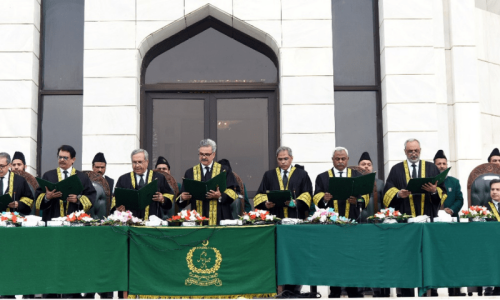PEOPLE care deeply about governance because it affects their daily lives. The public discourse around common issues often helps nudge governments towards addressing these challenges in the absence of constraints. However, one common mistake in this discourse is to make a direct comparison between developing and developed countries.
Comparing the governance outcomes of Pakistan with Britain today while attributing the ‘performance gap’ entirely to Pakistan’s inability to develop is misleading. This is because such a view of economic development assumes away the role of history and the long-run dynamics of economic development.
Take colonialism as a starting point. Most of the developing world had to bear the brunt of excessively extractive colonial institutions in recent history. Britain’s conscious deindustrialisation of the textile sector in the Indian subcontinent and Spain’s violent enslavement of the indigenous population in Latin America to extract precious metals are just a few examples of how colonialism impoverished the developing world.
At the same time, this violent, and often genocidal form of wealth extraction provided colonial masters with the capital and labour for their ‘economic development’. The traditional narrative of Britain’s development being solely attributable to the mechanisation that took place during the industrial revolution, without any role of colonial wealth extraction, rests on shaky grounds. Similarly, poverty in the developing world has a lot to do with colonialism — a fact that is often uncomfortable for developed countries to admit.
History’s role is often overlooked in assessing development.
Upon independence from their colonial masters, the developing world still had the remnants of extractive public institutions. Britain certainly did not introduce taxation and policing in its colonies as a benevolent dictator with the objective to improve people’s well-being. Instead, these institutions were designed for more nefarious purposes such as to exert control over colonies, maximise wealth extraction and ensure unfair market access for Britain’s goods. With path-dependency playing an important role, such institutions became hard to change after independence. These post-colonial public institutions exacerbated economic outcomes in the developing world.
It is also important to understand the long-run dynamics of economic development. Apart from a few exceptions, development is a gradual process that is hard to witness on a daily basis, but relatively easier to see in the long run.
It might surprise you that Pakistan’s GDP per capita, after adjusting for purchasing power parity, almost doubled in the last 20 years. While we might not see Pakistan developing on a day-to-day basis, the long-run trend shows a different picture. Hence, it is important to remember that countries become developed by growing consistently and sustainably at moderate rates of growth over a long duration of time.
This is not to say that we do not have exceptions — China and South Korea grew consistently at a high rate of growth over the last few decades. But the general rule of moderate and sustainable levels of growth as a path to economic development is important to keep in mind. Developing countries might aspire to emulate China and South Korea, but not being able to do so is certainly not a failure.
A flat out, cross-sectional comparison of developing and developed countries that ends up blaming developing countries entirely for a lack of an ability to ‘catch up’ pays little heed to the historical role of colonialism and extraction. It also ignores the fact that economic development is a long process that is hard to observe on a daily basis and requires consistency and patience.
This is not to say that developing countries should blame every problem on history or be complacent. Pakistan has been independent for over 70 years and we have to take responsibility for our own actions. A lot of the governance issues that we see around us could be solved by our citizens and policymakers. While some development outcomes might have improved, we have certainly contributed towards worsening existing problems or creating new ones.
The public discourse around economic development often commits the error of making a cross-sectional comparison between developing and developed nations. Such an attitude towards our current problems can be counterproductive because it paves the way for excessive self-blame and feelings of inferiority.
If we as citizens attribute the entire performance gap of Pakistan with any developed country to our inability to reform, we run the risk of overestimating our flaws and underestimating the role of historical path-dependence. A more nuanced understanding of economic development could help us move away from such thinking so that we focus more on how we can solve our problems in the future.
The writer is a PhD candidate at the University of Oxford and a graduate of Harvard Kennedy School of Government.
Twitter: @KhudadadChattha
Published in Dawn, August 14th, 2020













































